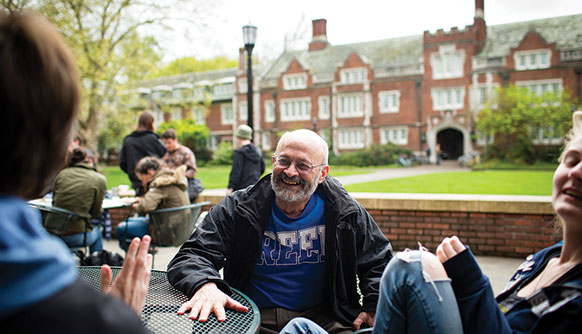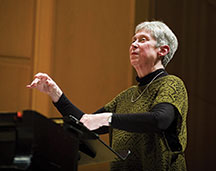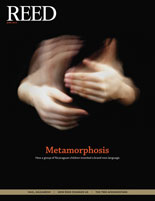
IRIS login | Reed College home Volume 92, No. 2: June 2013
Adventures in the First Person
Music to My Ears

Jim Kahan ’64 learns you can go home again. Photos by Leah Nash
by Jim Kahan ’64

Professor Virginia Hancock ’62
For alumni who live in Portland, one of the best deals in town is being able to audit a course at Reed for the pittance of $100. All you need is the permission of the instructor. Last fall, I audited Music Theory I, taught by Professor Virginia Oglesby Hancock ’62 [music 1991–]. The story, in short, is simple: I came, I audited, I survived.
It all started two years ago, when I was preparing A Reed Century, my adaptation of songs from Gilbert and Sullivan operettas to celebrate the Reed Centennial. Admittedly a musical amateur, I asked Ginny to help me by directing the singers for this Reunions presentation. At one point, she changed a note on my score so that a G-sharp became an A-flat. When I asked about this (after all, the two notes refer to the same black key on a piano), she said something about “enharmonic equivalence.” I looked it up and understood it—sort of. But later, when she came to a segment of four measures of madrigal-style four-part harmony that I needed to insert to cover a textual adaptation, she made major revisions. When I asked why, she replied that if I had ever taken her music theory course, I would understand. A year later, I decided to take up the challenge and set out on my adventure.
My first reaction upon finding myself back in Eliot 314 with some 30-odd Reed students was the shock of recognition. They were amazingly like people I knew 50 years ago. There were the studious types who took notes and never looked up, the class clowns reacting with loud guffaws to the examples of musical errors Ginny brought up, and the iconoclasts who interpreted everything as if it were jazz. Classroom attire ranged from barefoot to hiking boots; we sported an impressive variety of hairstyles for both men and women, from multicolored and shoulder-length to my own fringe around the back and sides. The students were smart—really smart. After a few weeks, they seemed to accept me as one of them, as they would not stop their hallway rants about professors when I showed up and would sometimes even ask how I interpreted a point.
My second reaction was the thrill of learning something new. In grad school, I took courses in statistics, social psychology, and game theory, but these were pretty much within my comfort zones, as I built upon established bases of knowledge. But although I have long appreciated music and even performed it, I possessed no theoretical foundation. So this was like going back to my freshman year—and it felt wonderful!
Although I was only auditing the course, I decided to go full tilt. I spent hours studying the material so that I could tell an appoggiatura (a leap then a step) from an escape tone (a step then a leap). I did exercises in writing four-part harmony that Bach would approve of. I learned the difference between a half-diminished and a diminished-diminished seventh chord and why it matters. By the end of the semester, I could even appreciate almost every joke in David Rakowski’s “Music Theory Song.”
My third reaction was a sense of astonishment at the workload. Reading, absorbing, and digesting the material took many long hours, quite apart from the time in class. How could these students possibly keep up with all their courses, which presumably had similar demands?
“Did we really work that hard back then?” I asked Ginny.
“Yes,” she smiled. “We sure did.”
有限公司
Following my graduation in 1964, I left Portland, and lived in a variety of places, including North Carolina, France, Nevada, Southern California, Israel, and the Netherlands. During my diaspora, I had frequent dreams of coming back to Reed, and even redoing my four years, armed, of course, with everything I had learned in the interim.
When waking from these dreams, I told myself that you can’t go home again. Fate, however, brought me back to Portland in 2005, blessed me with a new marriage to my Reedie bride, and enabled me to get intensely involved with the college. Now, with the lifespace to audit the courses I never had time for back then, I have learned that Thomas Wolfe was wrong—you can go home again.

LATEST COMMENTS
steve-jobs-1976 I knew Steve Jobs when he was on the second floor of Quincy. (Fall...
Utnapishtim - 2 weeks ago
Prof. Mason Drukman [political science 1964–70] This is gold, pure gold. God bless, Prof. Drukman.
puredog - 1 month ago
virginia-davis-1965 Such a good friend & compatriot in the day of Satyricon...
czarchasm - 4 months ago
John Peara Baba 1990 John died of a broken heart from losing his mom and then his...
kodachrome - 7 months ago
Carol Sawyer 1962 Who wrote this obit? I'm writing something about Carol Sawyer...
MsLaurie Pepper - 8 months ago
William W. Wissman MAT 1969 ...and THREE sisters. Sabra, the oldest, Mary, the middle, and...
riclf - 10 months ago